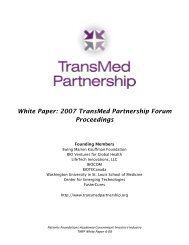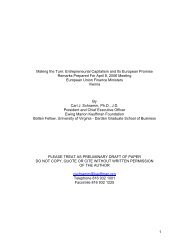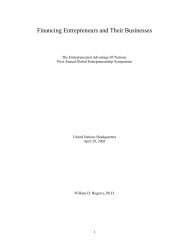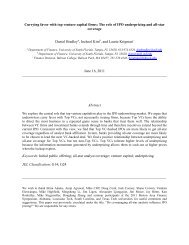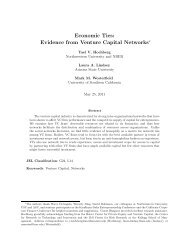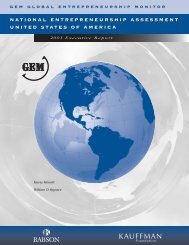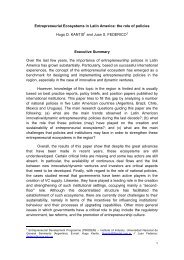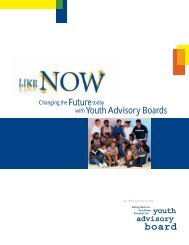Financing Child Care in the United States - Ewing Marion Kauffman ...
Financing Child Care in the United States - Ewing Marion Kauffman ...
Financing Child Care in the United States - Ewing Marion Kauffman ...
You also want an ePaper? Increase the reach of your titles
YUMPU automatically turns print PDFs into web optimized ePapers that Google loves.
START ME RIGHT (MAINE)<br />
DESCRIPTION<br />
Start ME Right provides support for children <strong>in</strong> <strong>the</strong>ir<br />
homes and child care programs, and provides<br />
opportunities for Ma<strong>in</strong>e bus<strong>in</strong>esses and <strong>in</strong>dividuals to<br />
<strong>in</strong>vest <strong>in</strong> child care. As a multipronged approach to<br />
support for children and families, Start ME Right <strong>in</strong>cludes<br />
a broad spectrum of <strong>in</strong>itiatives, with f<strong>in</strong>ancial support<br />
provided from <strong>the</strong> state’s tobacco settlement.<br />
WHEN ESTABLISHED<br />
Start ME Right passed <strong>the</strong> Ma<strong>in</strong>e legislature <strong>in</strong> 1999 for<br />
implementation beg<strong>in</strong>n<strong>in</strong>g <strong>in</strong> state’s FY1999–2000.<br />
ANNUAL AMOUNT<br />
Start ME Right is f<strong>in</strong>anced through Ma<strong>in</strong>e’s share of <strong>the</strong><br />
tobacco settlement. For Ma<strong>in</strong>e’s FY2000 year, a total of<br />
$1.575 million was appropriated for one–time–only<br />
facilities and quality improvements, <strong>in</strong>clud<strong>in</strong>g $150,000<br />
for a revolv<strong>in</strong>g loan fund. For FY2001, a total of $11.82<br />
million was appropriated: $8.91 million for child care<br />
improvement and expansion and $2.91 million for home<br />
visit<strong>in</strong>g. The $8.91 million for child care improvement and<br />
expansion allocations <strong>in</strong>cluded $300,000 for wage<br />
<strong>in</strong>creases and quality improvements, <strong>in</strong>clud<strong>in</strong>g add–on<br />
rates for accredited programs; $3.06 million to expand<br />
access to child care subsidies; $1.44 million to stimulate<br />
additional care at “odd hours” and to serve special<br />
populations; $393,000 for licens<strong>in</strong>g and <strong>in</strong>spections of<br />
child care; $394,000 for resource and referral services;<br />
and $1.5 million for full–day full–year Head Start;<br />
$575,000 to fund pilot programs for 12– to 15–year–<br />
olds and $150,000 for a Quality <strong>Child</strong> <strong>Care</strong> Education<br />
Scholarship Fund. Additional legislation is pend<strong>in</strong>g to<br />
<strong>in</strong>crease fund<strong>in</strong>g for FY2001 and beyond.<br />
SERVICES FUNDED<br />
To address child care needs <strong>in</strong> Ma<strong>in</strong>e, Start ME Right<br />
<strong>in</strong>cludes fund<strong>in</strong>g and programs to improve child care<br />
quality and affordability and to <strong>in</strong>crease capacity. These<br />
are described below. Start ME Right also <strong>in</strong>cludes a<br />
home–visit<strong>in</strong>g component, which provides <strong>in</strong>formation<br />
about parent<strong>in</strong>g as well as supportive services for<br />
children and families. The goal of this aspect of Start ME<br />
Right is to provide home–visit<strong>in</strong>g services to all first–time<br />
parents <strong>in</strong> Ma<strong>in</strong>e on a voluntary basis, with vary<strong>in</strong>g levels<br />
of service, depend<strong>in</strong>g on <strong>the</strong> family’s needs. Communities<br />
may choose from a list of approved home–visit<strong>in</strong>g<br />
models, and <strong>the</strong> bidd<strong>in</strong>g process is <strong>the</strong>n carried out at <strong>the</strong><br />
local level.<br />
The child care quality <strong>in</strong>itiatives are multifaceted, us<strong>in</strong>g<br />
both grant and tax strategies to <strong>in</strong>crease <strong>the</strong> supply of<br />
quality child care.<br />
• Professional development of child care teachers is<br />
addressed through <strong>the</strong> creation of a Tuition Assistance<br />
Program for child care providers, enabl<strong>in</strong>g <strong>the</strong>m to earn<br />
a <strong>Child</strong> Development Associate (CDA) credential or an<br />
A.A., B.S. or B.A. degree. The Tuition Assistance<br />
Program allows up to $500 per person, each semester,<br />
for a total of four courses annually.<br />
• Oversight and monitor<strong>in</strong>g resources are <strong>in</strong>creased<br />
through <strong>the</strong> addition of new child care licens<strong>in</strong>g staff.<br />
• Information about quality child care is enhanced<br />
through additional resource and referral services.<br />
• Parents who select an accredited child care provider<br />
can take advantage of new provisions <strong>in</strong> Ma<strong>in</strong>e’s tax<br />
plan which permit a doubled, refundable credit.<br />
Likewise, an employer that provides child care<br />
assistance to an employee is eligible to receive a<br />
doubled tax credit if <strong>the</strong> employee uses accredited<br />
child care. If a corporation provides a charitable child<br />
care contribution that is designed to improve child care<br />
quality, <strong>the</strong> bus<strong>in</strong>ess receives a 30 percent credit up to<br />
$30,000 annually.<br />
• One–time–only system–wide grants for health, safety,<br />
facilities and tra<strong>in</strong><strong>in</strong>g were provided <strong>in</strong> FY2000, with a<br />
maximum grant award of $5,000 for a family child care<br />
home and $20,000 for a center.<br />
The affordability of child care is addressed though<br />
dedication of new funds for Ma<strong>in</strong>e’s exist<strong>in</strong>g child care<br />
subsidy program, which allows parents to purchase child<br />
care for children through age 12.<br />
<strong>Child</strong> care capacity is addressed through several new<br />
<strong>in</strong>itiatives <strong>in</strong> Start ME Right.<br />
• Expansion of Head Start programs to full–day was<br />
<strong>in</strong>cluded, as well as a new effort to provide non–school<br />
hour programs to younger teenagers, ages 12 to 15.<br />
• A competitive grants program has been established to<br />
stimulate additional child care <strong>in</strong> geographically<br />
underserved areas and dur<strong>in</strong>g non–traditional hours.<br />
Should additional funds become available, <strong>the</strong> grants<br />
program would be expanded to stimulate child care<br />
capacity for at–risk children and those with special<br />
needs.<br />
• A revolv<strong>in</strong>g loan fund for child care providers has been<br />
established.<br />
• A new <strong>in</strong>vestment tax credit for child care has been<br />
created through which bus<strong>in</strong>esses can <strong>in</strong>vest <strong>in</strong> quality<br />
child care programs (def<strong>in</strong>ed as accredited) to receive<br />
a doubled tax credit.<br />
78




